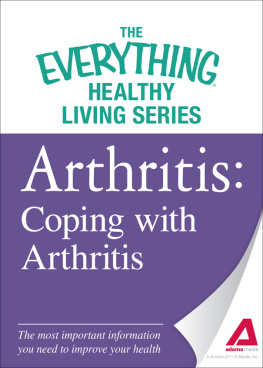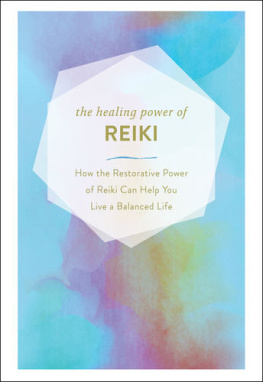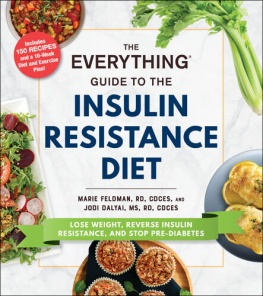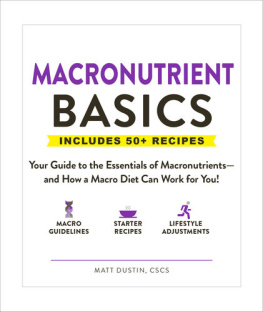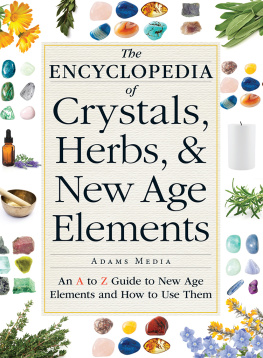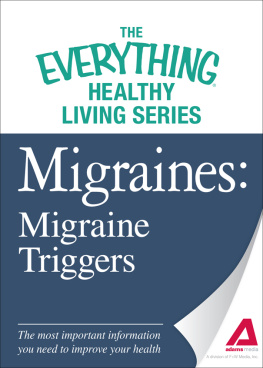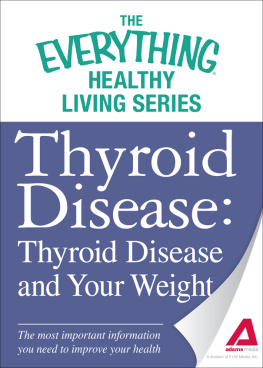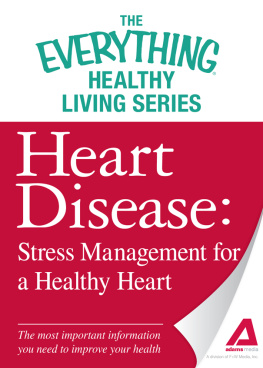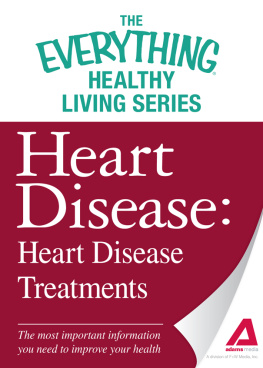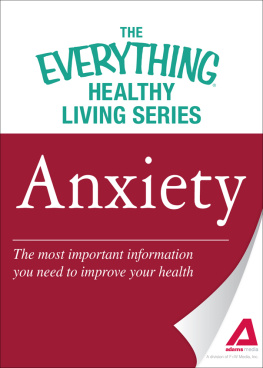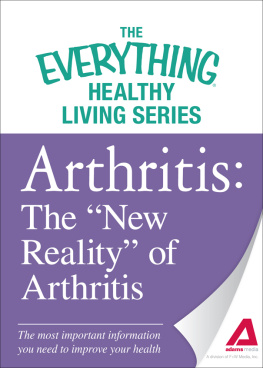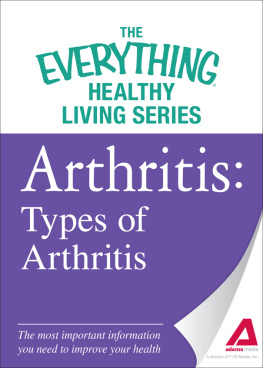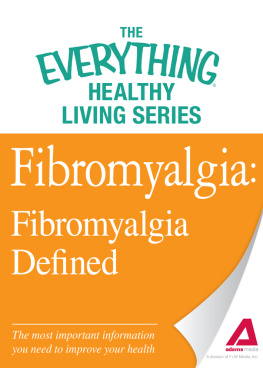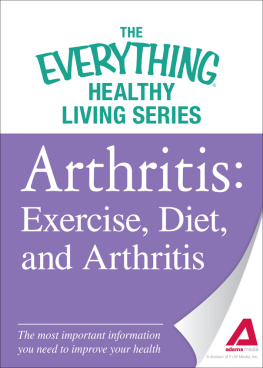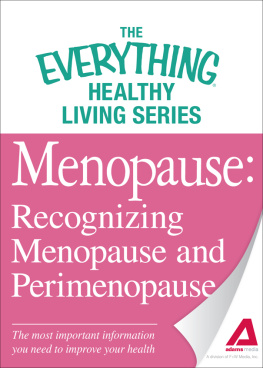The Everything Healthy Living Series
Arthritis: Coping with Arthritis
The most important information you need to improve your health
Adams Media, a division of F+W Media, Inc.
Avon, Massachusetts
Contents
Introduction
For more than 10 years, millions of readers have trusted the bestselling Everything series for expert advice and important information on health topics ranging from pregnancy and postpartum care to heart health, anxiety, and diabetes. Packed with the most recent, up-to-date data, Everything health guides help you get the right diagnosis, choose the best doctor, and find the treatment options that work for you.
The Everything Healthy Living Series books are concise guides, focusing on only the essential information you need. Whether youre looking for an overview of traditional and alternative migraine treatments, advice on starting a heart-healthy lifestyle, or suggestions for finding the right medical team, theres an Everything Healthy Living Book for you.
Arthritis
It can be completely unnerving to have nothing wrong with you one day and severe pain the next day. Since pain is a somewhat common symptom associated with many different conditions, it is hard to know initially what to do or how to react to the sudden change. Not every type of arthritis develops suddenly, but that sense of confusion that builds when you accept that its not going to go away can sometimes lead you down the wrong path.
No matter what type of arthritis you have, early diagnosis and early treatment can help prevent joint damage and disability. There are many approaches to treating arthritis, both conventional and alternative. There are myriad books written on the subject. The Internet provides even more information about arthritis. It can almost be considered too much information, because a person experiencing the initial onset of arthritis symptoms often doesnt know where to begin. Should you pick up a book about osteoarthritis and learn all about it? Maybe you should choose the book about rheumatoid arthritis? Perhaps its sufficient to self-treat with over-the-counter arthritis medications? How do you know you are making the right decisions?
Choosing the right starting point can impact the course of your disease. Its imperative to be evaluated by a rheumatologist, a specialist in diagnosing and treating arthritis and related conditions. Getting an accurate diagnosis is the first step to getting proper treatment and managing the disease.
Chronic arthritis affects every aspect of daily living. This practical guide will show you how to live better with arthritis. The day you are diagnosed with arthritis is the first day of your new reality. Your new reality can overwhelm you, or you can choose to face it with courage and perseverance. Your willingness to accept your new reality and adjust and adapt to it, as well as your ability to cope and an unwillingness to give up, are all factors that will influence how well you live with arthritis.
The intent of this book is to help you learn about the disease, teach you to be your own advocate, help you make better decisions, and inspire you to realize that there is still a high quality of life after an arthritis diagnosis. The first step: Understanding that change is inevitable.
If youd like to learn more about arthritis, check out The Everything Health Guide to Arthritis , available in print (978-1-59869-410-9) and eBook (978-1-60550-230-4) formats.
Living Well with Arthritis
How well you live with arthritis will depend on how well you cope with the changes that having a chronic disease will impose on your life. There will be physical changes and emotional changes, and on any given day you will be dealing with both at the same time. Your response to treatment will in part control your pain level and other arthritis symptoms, but your approach to living with arthritis will also have a big impact on how well you do.
Learning to Live with Pain
You wake up with pain. You go to bed with pain. Activity makes it flare. Rest doesnt always help much. Day after day after day it can be grueling. Yet you have to live your best life possible in spite of it.
Some people have a harder time than others learning to cope with chronic pain. People who feel out of control because of chronic pain are the ones who dont do as well. Its important to be consistent with actions which help you feel in control. You will help yourself cope with chronic pain if you:
- Find a doctor who understands how pain affects your life.
- Allow your thoughts and emotions to move away from the pain however you can accomplish it.
- Assess on a regular basis whether you are doing all you can do to control pain associated with arthritis.
- Replace bad habits that exacerbate pain (e.g., poor sleep habits) with good habits that promote pain relief.
- Accept that pain is a disruption in your life, but never stop searching or discovering ways to minimize the disruption.
- Chronic pain lasts a lifetime, so you must make decisions that will have long-lasting positive effects.
Chronic Pain Studies
The above advice may sound great in theory, but it must truly be applied. A study led by Lance M. McCracken from the University of Chicago, published in the journal Pain in 1998, reported that acceptance of pain was associated with lower pain intensity, less pain-related anxiety and avoidance, less depression, less physical and psychosocial disability, more daily uptime, and better work status.
Another study, published in the same journal in 1999 (Arnstein et al.), concluded that the lack of belief in ones own ability to manage pain, cope and function despite persistent pain, is a significant predictor of the extent to which individuals with chronic pain become disabled and/or depressed.
The studies reinforce that goals for learning to live with chronic pain should focus on: reducing pain, improving function, and building upon the belief that you can cope (self-efficacy).
Never Give Up
Chronic pain can be relentless, and you may begin to feel nothing you do matters. Never give up. Expect to have bouts of pain that seem untouchable. Remember that you are like a football player that has to take the field for every game. Arthritis is no game, but the analogy still fits. You have to keep taking the field. Keep in mind that certain factors exacerbate pain, while other factors help block or control pain. Focus on the factors that help control pain, such as medication, physical activity or exercise, relaxation techniques, and distraction (e.g., humor, hobbies). Avoid whatever exacerbates the pain-stress-depression cycle.
Find What Works for You
Though its helpful to learn what helps other chronic pain and arthritis patients cope with pain, its important to figure out what works for you. Never allow yourself to feel overwhelmed or to believe you are out of options. If whatever pain-relieving technique has worked in the past has become less effective, you may have to add more weapons to fight pain.
Feeling defeated will consume energy you need to fight pain. Its easier to say than to do, but you must replace feelings of discouragement with courage, hopelessness with hopefulness, pessimism with optimism, and passivity with assertiveness. John Quincy Adams once said, Patience and perseverance have a magical effect before which difficulties disappear and obstacles vanish.

